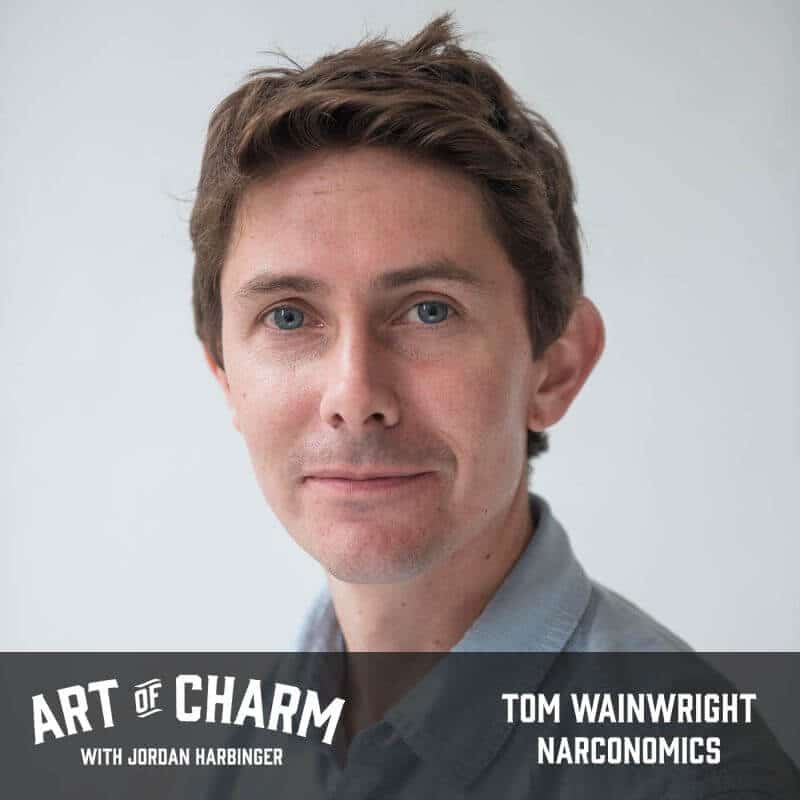Tom Wainwright (@t_wainwright) of The Economist shares the harrowing and sometimes grisly experiences he endured to write Narconomics: How to Run a Drug Cartel.
The Cheat Sheet:
- Understand the parallels between the drug trade and regular businesses.
- Learn how ideas of economics and business apply to any entrepreneurial or business venture.
- Discover how drug cartels engage in corporate social responsibility, branding, and even PR campaigns.
- Hear why drug cartels franchise, regulate labor, branch out online, and diversify into legal (and ubiquitous) industries.
- Perhaps most intriguing of all: find out how an economist gets discovered wearing a GPS device to a meeting with a drug lord and lives to tell the tale!
- And so much more…
[aoc-subscribe]
If you’re a fan of the Netflix-backed series Narcos — which details the exploits of slippery ’80s Colombian drug lord Pablo Escobar and the law enforcers who risked everything to bring him down — then you’re going to love this episode of The Art of Charm. Narconomics: How to Run a Drug Cartel author Tom Wainwright joins us to explain how such an illicit trade thrives, why staying the course in the War on Drugs is failing, and what can be done to correct that course.
This episode might give you nightmares, but you’ll never complain about economics being boring again! It’s not our typical fare, but it’s a story too compelling to keep to ourselves. Enjoy!
More About This Show
On assignment as the Mexico City bureau chief for The Economist, journalist Tom Wainwright was expecting to write about the car industry and tourism.
“I arrived and found very quickly that the only thing people really were interested in talking about was a different kind of business,” says Tom. “Namely the drugs business. So I found myself writing a lot about it. And the more I covered this industry — and the more I spoke to the people involved in it whether they were the cartel leaders or the traffickers or the consumers or the rest — the more I realized that actually this business was really a business like any other. It had various things in common with other kinds of business.”
This got Tom to wondering what would happen if he reported the drug trade as a business instead of, as most media did, a war? “How would it be if we wrote about these cartels as if they were ordinary companies and analyzed them in that way?” says Tom. “What would we learn?”
Sure, drug cartels deal in illegal merchandise. Sure, drug cartels use the drama of brutal violence to rule their domains with fear and eliminate competition. But the numbers on their ledger sheets wouldn’t look much different from those of more legitimately recognized companies. And it was looking at them from this unconventional perspective that Tom realized the War on Drugs would only be winnable if fought in an unconventional way.
“I’m not trying to claim [the drug trade] is not criminal and that it’s not immoral — I think it’s both of those things.” says Tom. “But my argument is just that, really, if we want to defeat these guys, we’ve got to understand how they work. And the key to understanding how they work is recognizing what they are and that is profit-motivated businesses.”
While popular media focuses on covering the drug trade as something driven by chaos and bloodlust perpetrated by lawless fiends, the reality is that money — as with any business venture, whether it be ice cream sales, acupuncture services, or cocaine distribution — is what really makes this world go around.
But the value of the drug trade is grossly miscalculated by this same media, which calls into question its overall credibility. Tom explains:
“The Mexican armed forces had just made a huge seizure of marijuana on the edge of Tijuana. It was about a hundred tons of the stuff. And it was widely reported that this was all worth about half a billion dollars. This struck me as a huge amount of money, so I had a look at how they’d [arrived at this number].
“What they’d done was they’d taken the retail price of cannabis in the United States and they’d gone for a kind of conservative estimate of five dollars a gram. And they’d multiplied this out over a hundred tons and arrived at this figure of half a billion dollars. That sounds perfectly sensible and you might think, ‘Okay, that’s a kind of economic approach.’ But if you apply that to any other business, it’s clear that that’s a crazy thing to do!
“Imagine if you did that with, say, coffee. And you said, ‘Okay, here we’ve got a kilo of coffee in Colombia. How much is that worth? Well, a cup of coffee in Starbucks in the United States costs two or three dollars, and in there you get a couple of grams of coffee, so let’s say it’s about a dollar a gram. Therefore, a kilo of coffee in Colombia is worth a thousand dollars? No, right? That’s fairly obviously wrong! And yet that’s exactly what we do with drugs. We constantly do this thing of calculating the price of drugs seized in Mexico using retail prices in the States or in Europe. And that’s why we get these very inflated numbers.
“And it just made me think…if we’re getting basic stuff like that wrong, what else are we getting wrong in our understanding of the War on Drugs? Where else are we overestimating the effectiveness of our current policies?”
Listen to this episode of The Art of Charm to learn more about how cocaine and coffee are worth about the same from the source — it’s the criminalization that raises prices thirty thousand percent by the time it gets to the United States, why farmers plant drug cash crops on land that would otherwise be growing food in spite of the risks involved, why it makes more sense to focus on diminishing demand rather than supply, the kind of slang you pick up on the job when your job is interviewing people involved in the drug trade, how a cartel operates a PR campaign, how local governments have employed social media to dispense information without fear of cartel intimidation, how a cartel franchises, how the drug trade has adapted to the Internet, what “legitimate” merchandise indirectly supports cartel finances, and lots more.
THANKS, TOM WAINWRIGHT!
If you enjoyed this session with Tom Wainwright, let him know by clicking on the link below and sending him a quick shout out at Twitter:
Click here to thank Tom Wainwright at Twitter!
Resources from this episode:
- Narconomics: How to Run a Drug Cartel by Tom Wainwright
- Tom Wainwright at The Economist
- Tom Wainwright at Twitter
- Netflix’s trailer for Narcos
- Who was Kiki Camarena?
- Sons of Notorious Mexican Cartel Leader El Chapo Take to Twitter to Brag about Their Girls, Guns, and Fast Cars, Daily Mail
You’ll also like:
- The Art of Charm Challenge (click here or text 38470 in the US)
- The Art of Charm Bootcamps
- Best of The Art of Charm Podcast
- The Art of Charm Toolbox
- The Art of Charm Toolbox for Women
- Find out more about the team who makes The Art of Charm podcast here!
On your phone? Click here to write us a well-deserved iTunes review and help us outrank the riffraff!




